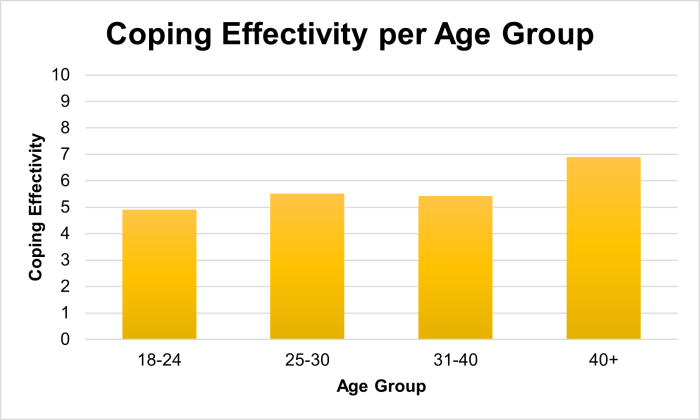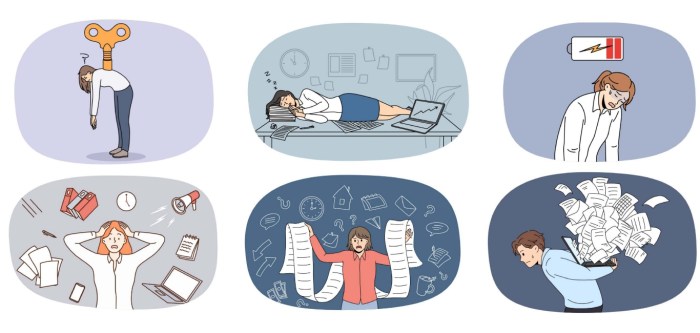Starting with How to Meditate for Reducing Overwhelm and Mental Exhaustion, this paragraph aims to draw in readers with an intriguing overview of the topic, highlighting the importance of managing stress and mental well-being through meditation.
As we delve further, we will explore the benefits of meditation, techniques to reduce overwhelm, strategies to combat mental exhaustion, and tips for beginners looking to start their meditation practice.
Introduction to Meditation for Reducing Overwhelm and Mental Exhaustion

Meditation is a powerful practice that can significantly reduce feelings of overwhelm and mental exhaustion. By incorporating meditation into your daily routine, you can experience a wide range of benefits that positively impact your overall well-being.
After a long day of hard work, it’s essential to unwind and relax. Discover the art of meditation for relaxation with our guide on How to Meditate for Unwinding and Relaxing After a Long Day. Let go of stress and tension as you immerse yourself in a state of tranquility and peace.
One of the key advantages of meditation is its ability to help manage stress effectively. Through focused breathing and mindfulness techniques, meditation can calm the mind, reduce anxiety levels, and promote a sense of inner peace.
Good morning, dear seekers of enlightenment! Today, let’s talk about the power of meditation in boosting your productivity. In just 5 minutes, you can rejuvenate your mind and enhance your focus with this 5-Minute Meditation to Boost Your Productivity. Take a moment to breathe deeply and center yourself before diving into your tasks for the day.
Benefits of Meditation for Reducing Overwhelm and Mental Exhaustion
- Enhances emotional well-being by reducing stress and anxiety levels.
- Improves focus and concentration, leading to enhanced productivity.
- Promotes relaxation and helps in achieving a state of mental clarity.
- Increases self-awareness and fosters a sense of inner peace.
Why Meditation is an Effective Tool for Managing Stress and Improving Mental Well-being
- Meditation helps in regulating the body’s stress response, leading to a decrease in cortisol levels.
- It allows individuals to cultivate a more positive outlook on life by fostering gratitude and compassion.
- Regular meditation practice can rewire the brain, promoting emotional regulation and resilience.
How Regular Meditation Practice Can Help in Achieving a Sense of Calm and Clarity
- Consistent meditation practice trains the mind to focus on the present moment, reducing rumination and overthinking.
- It promotes relaxation by activating the parasympathetic nervous system, also known as the “rest and digest” response.
- Regular meditation sessions create a sense of routine and stability, providing a foundation for emotional well-being.
Understanding Overwhelm and Mental Exhaustion

When we talk about overwhelm, we are referring to a feeling of being completely submerged or overpowered by something, whether it be emotions, tasks, or responsibilities. It is a state of being mentally or emotionally paralyzed by the sheer amount of things that need to be addressed or processed. Mental exhaustion, on the other hand, is the depletion of mental energy and the feeling of being drained or fatigued mentally.
As the sun rises, it’s crucial to start your day on the right note. Join us for a 15-minute guided meditation that will set the tone for a successful day ahead. This 15-Minute Guided Meditation to Start Your Day Right will help you cultivate a sense of calm and clarity, preparing you for whatever challenges may come your way.
Examples of Situations Leading to Overwhelm and Mental Exhaustion
- High-pressure work environments with tight deadlines and heavy workloads can lead to overwhelm and mental exhaustion.
- Personal relationships that are strained or conflict-ridden can also contribute to feelings of overwhelm and mental exhaustion.
- Constant exposure to negative news or social media can be overwhelming and mentally exhausting.
Impact of Chronic Stress on Mental Health
Chronic stress, which often accompanies overwhelm and mental exhaustion, can have a significant impact on mental health. Prolonged exposure to stress hormones can lead to anxiety, depression, and other mental health disorders. It can also weaken the immune system, making individuals more susceptible to physical illnesses. Finding ways to manage stress and prevent overwhelm is crucial for maintaining good mental health.
Techniques for Meditating to Reduce Overwhelm

Mindfulness meditation is a powerful technique that can help reduce overwhelm by bringing your focus to the present moment. By practicing mindfulness, you can become more aware of your thoughts and feelings without judgment, allowing you to let go of stress and anxiety.
Mindfulness Meditation
- Find a quiet and comfortable place to sit or lie down.
- Close your eyes and focus on your breath, taking deep inhales and exhales.
- Notice any thoughts or feelings that arise without attaching to them, simply observing and letting them go.
- Continue to bring your attention back to your breath whenever your mind starts to wander.
- Practice mindfulness meditation for at least 10-15 minutes a day to experience its full benefits.
Deep Breathing Exercises
- Sit or lie down in a comfortable position and place one hand on your chest and the other on your abdomen.
- Inhale deeply through your nose, feeling your abdomen rise as you fill your lungs with air.
- Exhale slowly through your mouth, feeling your abdomen fall as you release the air.
- Repeat this deep breathing exercise for several minutes to calm your mind and reduce feelings of overwhelm.
Creating a Calming Meditation Environment
- Choose a quiet and clutter-free space where you can meditate without distractions.
- Light a candle or use essential oils like lavender to create a soothing atmosphere.
- Play soft music or nature sounds to enhance relaxation during your meditation practice.
- Sit on a comfortable cushion or chair with good posture to promote relaxation and focus.
- Avoid meditating in bed to prevent falling asleep and maintain a clear boundary between rest and meditation.
Strategies for Using Meditation to Combat Mental Exhaustion

Mental exhaustion can be incredibly draining, affecting our overall well-being and productivity. Fortunately, meditation can be a powerful tool to combat mental fatigue and restore balance to our minds.When it comes to incorporating meditation into your daily routine to combat exhaustion, consistency is key. Setting aside dedicated time each day for meditation can help you build a habit and reap the benefits over time.
Whether it’s in the morning to start your day on a calm note or in the evening to unwind and relax, find a time that works best for you and stick to it.
Guided Meditation
- Consider using guided meditation sessions specifically designed to combat mental exhaustion. These sessions often include soothing music, calming visualizations, and prompts to help you focus and relax.
- Apps like Headspace, Calm, or Insight Timer offer a variety of guided meditations tailored to reduce stress and mental fatigue.
Body Scan Meditation
- Body scan meditation involves focusing on each part of your body sequentially, bringing awareness to any tension or discomfort and consciously releasing it.
- This technique can help you tune into your body’s signals, release physical tension, and promote relaxation, which can be especially beneficial for combating mental exhaustion.
Breath Awareness Meditation, How to Meditate for Reducing Overwhelm and Mental Exhaustion
- Simply focusing on your breath can be a powerful way to anchor yourself in the present moment, calm your mind, and reduce mental fatigue.
- Practice deep, rhythmic breathing while paying attention to the sensation of each inhale and exhale. This can help quiet racing thoughts and promote a sense of calm.
Tips for Beginners Starting Meditation Practice: How To Meditate For Reducing Overwhelm And Mental Exhaustion

Starting a meditation practice can be challenging for beginners, but with the right approach, it can be a rewarding and transformative experience. Here are some tips to help you begin your meditation journey:
Set Realistic Expectations
When starting a meditation practice, it’s important to set realistic expectations. Understand that meditation is a skill that takes time to develop, and it’s normal to have wandering thoughts during your practice. Be patient with yourself and allow yourself to grow at your own pace.
Start Small
Begin with short meditation sessions, such as 5-10 minutes, to avoid feeling overwhelmed. As you become more comfortable with the practice, you can gradually increase the duration of your sessions. Consistency is key, so try to meditate daily even if it’s just for a few minutes.
Find a Quiet and Comfortable Space
Choose a quiet and peaceful space for your meditation practice where you won’t be disturbed. It’s also important to sit in a comfortable position, either on a cushion on the floor or in a chair with your back straight. Creating a calming environment will help you focus during your practice.
Use Guided Meditations
For beginners, guided meditations can be a helpful tool to stay focused and learn different meditation techniques. There are many resources available online, such as apps, podcasts, and videos, that offer guided meditation sessions suitable for beginners. Experiment with different styles to find what resonates with you.
Be Kind to Yourself
It’s normal to feel restless or distracted when starting a meditation practice. Instead of getting frustrated, practice self-compassion and gently bring your attention back to the present moment. Remember that meditation is a practice, and each session is an opportunity to learn and grow.
Join a Meditation Group
Consider joining a meditation group or class in your community to connect with like-minded individuals and receive support on your meditation journey. Practicing with others can provide motivation, accountability, and a sense of community that can enhance your meditation experience.
Stay Consistent
Consistency is key when it comes to establishing a meditation practice. Set a regular schedule for your meditation sessions and try to stick to it, even on days when you don’t feel like meditating. Over time, you’ll start to notice the benefits of regular meditation practice in reducing overwhelm and mental exhaustion.
Wrapping up the discussion on How to Meditate for Reducing Overwhelm and Mental Exhaustion, we have covered key insights on how meditation can bring calm and clarity to one’s life, offering a path to improved mental health and overall well-being. Start your meditation journey today and experience the transformative power it can have on your life.